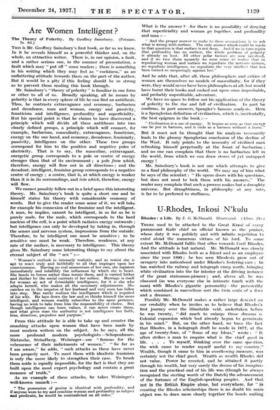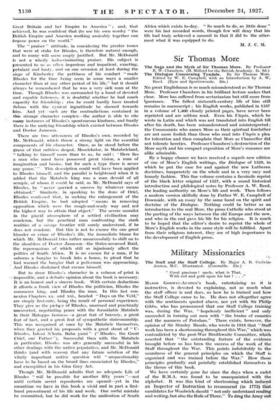U-Rhodes, Inkosi N'kulu
Rhodes : a Life. By J. G. McDonald. Illustrited. (Allan. 2IS.) THERE used to be attached to the Great Kraal of every paramount Kafir chief an official known as the praiser, whose duty it was publicly and with infinite repetition to extol aloud the numerous virtues of his lord. To some extent Mr. McDonald fulfils that office towards Cecil Rhodes. And the attitude is but natural. Mr. McDonald was closely associated with Rhodes both as a friend and as an employee since the year 1890; he has seen Rhodesia grow out of savagery into nationhood under Rhodes's fostering care ; he has watched the railway and telegraph creep north, bringing white civilization into the far interior at the driving instance of the great statesman-pioneer ; and, above all, he was obsessed (as was everyone else in intimate touch with the man) with Rhodes's gigantic personality—the personality which combined in marvellous sort the twin souls of a doer and a dreamer.
Possibly Mr. McDonald makes a rather large deniand on our credulity when he invites us to believe that Rhodes's first journey over the illimitable veld, undertaken before he was twenty, "did much to enlarge those dreams o Colonial expansion which had already begun to germinate in his mind." But, on the other hand, we have the fact that Rhodes, in a holograph draft he made in 1877, at the age of twenty-four, of "Some of my Ideas," wrote : "It often strikes a man to enquire what is the chief good in life. . . . To myself, thinking over the same question, the wish came to render myself useful to my country." Wealth, though it came to him in overflowing measure, was certainly not the chief good. Wealth as wealth Rhodes did not value. Power he coveted, and he attained it partly through his wealth, but very surely the dream of his imagina- fion and the practical end of his life was (though he always recognized the sterling worth of the Dutch) the advancement of the fortunes of the English-speaking peoples. And that not in the British Empire alone, but everywhere, for "in creating the Rhodes scholarships there is no doubt his main object was to draw more closely together the bonds uniting
Great Britain and her Empire to America " ; and, that achieved, he was confident that (to use his own words) • "the British Empire and America working amicably together can impose peace on the world." • The " praiser " attitude, in considering the greater issues that were at stake for Rhodes, is therefore natural enough, and to many will seem amply justified. But Mr. McDonald is not a wholly indiscriminating praiser. His subject • is presented to us as often imperious and impatient, exacting, petulant and hasty, and on one occasion at least during the siege of Kimberley the pettiness of his conduct "made Rhodes for the time being seem in some ways a smaller character than at any other period of his life," but it should always be remembered that he was a very sick man at the time. Though Rhodes was surrounded by a band of devoted and capable followers-, it is doubtful whether he had much capacity for friendship ; else he could hardly have treated Selous with the cynical ingratitude he showed towards -him. And vet--such are the contradictions contained in this strange character complex—the author is able to cite many instances of Rhodes's spontaneous kindness, and finally there is the undying friendship which existed between Rhodes and Doctor Jameson.
There are two utterances of Rhodes's own, recorded by Mr. McDonald, which throw a strong light on the essential components of his character. Once, as he stood before the grave of that ruthless despot, Moselekatse, in Matabeleland, "talking to himself more than to us, he said : Here lies a man who must have possessed great vision; a man of imagination and brains, but for such a type there is never any peace.' " This description could well have been applied to Rhodes himself, and the parallel is heightened when it is added that –the Matabele king was a man devoid of all scruple, of whom it could be said, as Mr. McDonald says of Rhodes, he "never queried a success by whatever means obtained." Similarly, in speaking to the dons. of Oriel, Rhodes confessed that, in seeking the enlargement of the British Empire, he had adopted "means in removing opposition which were the rough-and-ready way and not the highest way to attain that object." The severe moralist in the placid atmosphere of a settled civilization may condemn, but the practical man confronting the stark realities of a savage frontier will surely understand, if he does not condone. Bid this is not to excuse the one great blunder or crime of Rhodes's life, the immediate blame for which Mr. McDontild tries rather unsuccessfully to shift on to the shoulders of Doctor Jameson—the thrice-accursed Raid, the repercussions of which still so 'injuriously affect the politics of South Africa. It is no excuse for a man, if he suborns a burglar to break into a house, to plead that he had warned the burglar that a policeman was approaching. And Rhodes disdained that excuse himself.
But to draw Rhodes's character in a column of print is
--: impossible, and a definite opinion about the book is necessary. It is an honest and a sincere book. With certain deductions it affords a frank view Of Rhodes the politician, Rhodes the commerce king, and Rhodes the man. In this last con- nexion Chapters xx. and xxi., headed "Days on the Veld," are simply first-rate, being the result of personal experience. They give us the picture of Rhodes, unarmed and practically unescorted, negotiating peace with the formidable Matabele In their Matoppo fastnessa great feat of bravery, a great feat of tact, and a great feat of sympathetic statesmanship. This was recognized at once by the Matabele themselves, when they greeted his proposals with a great shout of "U- Rhodes, Inkosi N'kulu, Baba yami " (" Rhodes, the, Great Chief, our Father "). Successful then. with the Matabele in particular, Rhodes was alto generally successful in his other dealings with the native population, and Mr. McDonald thinks (and with reason) that any future solution of the vitally important native question will "unquestionably have to be 'based on the broad lines enunciated by Rhodes," and exemplified in his Glen Grey Act.
Though Mr. McDonald admits that no adequate Life of Rhodes "will be possible for another fifty years "—not until certain secret repositories are opened—yet in the meantime we have in this book a vivid and in part a first- hand presentment of his life and work. One awful mistake he committed, but he did work for the unification of South
Africa which exists to-day. "So much to do, so little done" were his last recorded words, -though few* will deny that his life had truly achieved a summit in that it did to the utter- most what it 'was equipped to do. . M. J. C. M.































 Previous page
Previous page